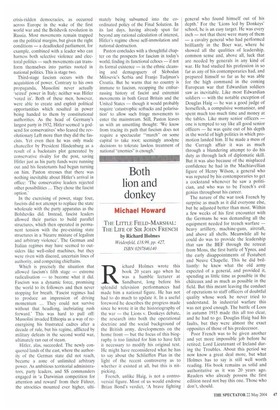Both lion and donkey
Michael Howard
THE LITTLE FIELD-MARSHAL: THE LIFE OF SIR JOHN FRENCH by Richard Holmes Weidenfeld, .08.99, pp. 427, ISBN 0297846140 Richard Holmes wrote this book 20 years ago when he was a humble lecturer at Sandhurst, long before his splendid television performances had made him a national figure. He has not had to do much to update it. In a useful foreword he describes the progress made since he wrote it in the historiography of the war — the Lions v. Donkeys debate, the research into both the operational doctrine and the social background of the British army, developments on the home front — but the focus of this biography is too limited for him to have felt it necessary to modify his original text. He might have reconsidered what he has to say about the Schlieffen Plan in the light of the recent controversy as to whether it existed at all, but this is nitpicking.
French, unlike Haig, is not a controversial figure. Most of us would endorse Brian Bond's verdict, 'A brave fighting general who found himself out of his depth.' For the 'Lions led by Donkeys' school, he is an easy target. He was every inch — not that there were many of them —a cavalry general who had performed brilliantly in the Boer war, where he showed all the qualities of leadership, common sense and, above all, luck that are needed by generals in any kind of war. He had studied his profession in so far as any of his contemporaries had, and prepared himself so far as he was able for the high command in the coming European war that Edwardian soldiers saw as inevitable. Like most Edwardian soldiers — with the notable exception of Douglas Haig — he was a good judge of horseflesh, a compulsive womaniser, and spent much too much time and money at the tables. Like many senior officers — one is tempted to say like all good senior officers — he was quite out of his depth in the world of high politics in which promotion landed him. If he made a mess of the Curragh affair it was as much through a blundering attempt to do his duty as through lack of diplomatic skill. But it was also because of the misplaced confidence he had in the Machiavellian figure of Henry Wilson, a general who was reputed by his contemporaries to get a cockstand whenever he saw a politician, and who was to be French's evil genius throughout his career.
The nature of the war took French by surprise as much as it did everyone else, but he adjusted better than most. Within a few weeks of his first encounter with the Germans he was demanding all the equipment needed for trench warfare — heavy artillery, machine-guns, aircraft, and above all shells. Meanwhile all he could do was to provide the leadership that saw the BEF through the retreat from Mons, the first battle of Ypres, and the early disappointments of Festubert and Neuve Chapelle. This he did brilliantly: he knew what the old army expected of a general, and provided it, spending as little time as possible in the châteaux and as much as possible in the field. But this meant leaving the conduct of operations to staff officers of doubtful quality whose work he never tried to understand. In industrial warfare this was not good enough. The battle of Loos in autumn 1915 made this all too clear, and he had to go. Douglas Haig had his faults, but they were almost the exact opposites of those of his predecessor.
Poor French was to be given another and yet more impossible job before he retired; Lord Lieutenant of Ireland during the Troubles. About this period we now know a great deal more, but what Holmes has to say is still well worth reading. His book remains as solid and authoritative as it was 20 years ago. Readers who already possess the first edition need not buy this one. Those who don't, should.


















































































 Previous page
Previous page